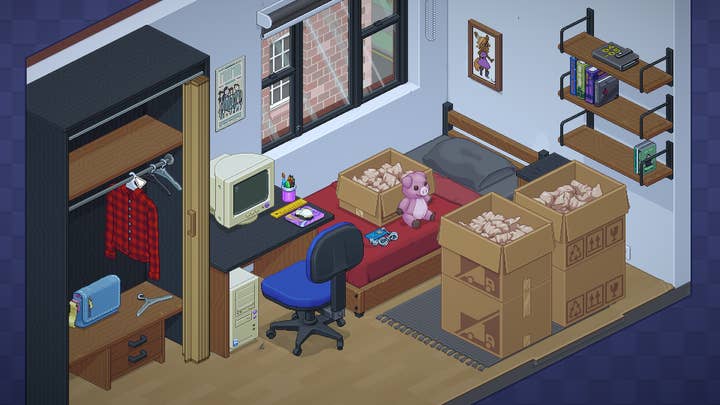How Unpacking kept a steady heartbeat after going viral years before launch
Witch Beam's Wren Brier and Tim Dawson discuss how they cultivated their passion project's spark after it went viral
In 2018, a kitchen took the games industry by surprise.
Unpacking had already garnered attention by being featured in the Stugan accelerator program, but a GIF featuring the game's kitchen being unpacked was liked over 11,600 times on Twitter and retweeted over 3,500 times in August 2018.
The game went viral only three months into development and developer Witch Beam ended up in the most curious of situations.
Their game attracting such attention was by all means reassuring this early in development. But how do you maintain momentum when you go viral three months into the development of a game that will require literal years to finish?
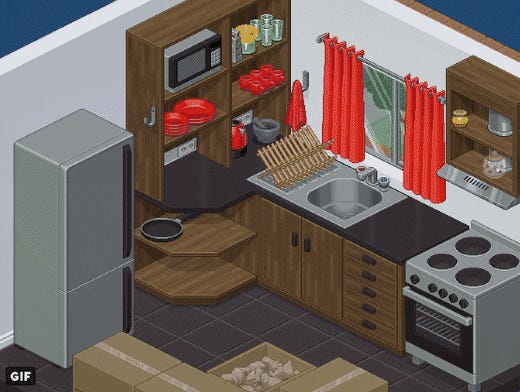
Keeping the spark going
"When we posted that GIF and people were really interested in it, it [was] really validating, it helped open doors, it made us feel this is the project we should be working on," Unpacking's programmer and co-designer Tim Dawson tells the GamesIndustry.biz Academy.
"But the two things that stuck out to me was keeping people interested in it, because it's not ready to go, and being worried that people were connecting to the wrong thing."
Going viral is one thing, Dawson continues, but if your game actually is very different from the snippet that attracted so much attention, then you're in for a challenge.
"It's not that people are interested, it's this one moment that caught fire. It doesn't mean everyone wants to see this game"Tim Dawson, Witch Beam
"Games are these complex beasts and we have all these specific things that, if you looked at that gif, and thought: 'Oh I love the game where I get to arrange my dream house exactly the way I want it', you'd be wrong, because it's actually about exploring someone through their items," Dawson adds. "Those are two sides: keeping people's interest and also making sure that people understood what we were making and still wanted that."
Dawson also mentions that this type of success -- going viral -- is very difficult to replicate. He mentions a GIF he created for Witch Beam's previous game, Assault Android Cactus, which showed a character doing a weapon swap in slow motion.
"I posted it on Twitter and it went off and got really good numbers," he explains. "And it was funny because I came back to it a couple of times, I tried to do nicer ones, and no one ever cared about the other ones later on. And it always made me worried because it's not that people are interested, it's this one moment that caught fire. It doesn't mean everyone wants to see this game."
Wren Brier, Unpacking's creative lead, says that's exactly what the team was worried about: is Unpacking a one-off? Or is this something that will keep people's attention?
"Unpacking probably wouldn't have happened if people didn't show interest in it. We were doing it as a side project"Wren Brier, Witch Beam
"We were also wondering: is it just this kitchen that will be good for people to play, or will they enjoy other rooms too?," she says. "Every time we make a new room, people seem to be into it, but will they like a bigger apartment with several rooms? And slowly we saw that, yes, people were interested in what we were doing and they liked the direction we were taking the idea in.
"The thing [is] Unpacking probably wouldn't have happened if people didn't show interest in it. We were doing it as a side project so it's hard to say this happened accidentally, but we couldn't have really done it any other way, because it only became Witch Beam's next game when people [were] into this!"
Brier gave a talk about how Unpacking was an "accidental commercial game," as the team at the time was debating whether this would be their next full time project.
"I think one way of thinking about it is that the virality was a spark but it's all about: can you keep it going?," Dawson says. "You can definitely do something with it, but it could also just as well vanish."
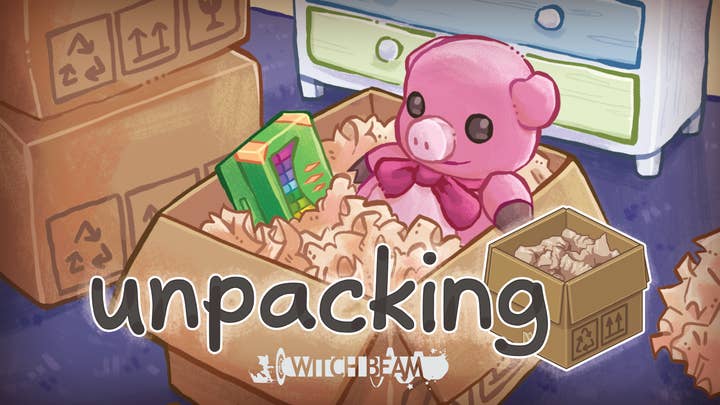
Being everywhere without giving away everything
Armed with the doubts that people might just be interested in the novelty of unpacking one room while Witch Beam had this long, arching storyline in mind, the team put together a strategy to figure out whether their game could keep people's interest going.
As Dawson says: "The point of doubts is to test them."
From the moment the game went viral, Unpacking was presented to events across the world. PAX Australia, Melbourne Games Week, Day of the Devs, BitSummit, GDC, and more.
"We had to continuously be present with the game, we had to make sure that it was everywhere," Brier says. "We tried to make sure we updated our Twitter at least every couple weeks, sometimes every three weeks during slower times. We were always on the lookout for events, so when it was in person, we traveled a lot.

"We had to be constantly trying to show new stuff. It was really important to us to not reveal everything, because we knew that we had to save a lot for the final marketing beat toward the end. We didn't want to reveal all our secrets months and months ahead. We kept having to think about what's safe, what can we show?"
She adds that it's not about finding "filler content" but about showing different aspects of elements that have already been unveiled. And then very slowly introducing new content.
But not every update you share needs to be big, serious announcements.
"It's important to make funny things that people can relate to," Brier says. "Sometimes we did really dumb stuff. When we introduced more rotations to the items in the original kitchen -- so items wouldn't just turn two ways, but four ways -- Tim was like, 'Hey, good news, you can do this now,' in a tweet.
"And what he does is he opens the drawer, takes out the bundle of forks, flips it backwards and puts it back in and closes the drawer. And that was the tweet! And a lot of people engaged with it."
Sometimes, the heresy of putting cutlery upside down is all you need to engage your community.

"I think a big part of this is you want to have a heartbeat," Dawson says. "Because we realised the game [was] going to take ages to finish. We had to pace ourselves, we can't just be posting the latest thing we're working on every day because we need to spread this out."
To tackle this challenge, Witch Beam decided to focus on little dioramas showcasing specific objects or mechanics.
That way, the team was showcasing items within a room rather than the full room itself. Not every diorama, not every tweet, got huge engagement, Brier says, but it was good to have something.
"It's better than nothing," she continues. "It's useful to think about what people will engage with but it's also important to pace ourselves. We worked on this one kitchen with all these items for three months, and we can throw it in one screenshot. That's just revealing everything we've got."
It's about finding the interactions that look satisfying, she says, and the tiny details in the bigger scenes.
"It was nice when we could ask questions as well, because people like answering questions," Dawson adds. "We put a bunch of retro toys and say: what are your favourite toys? And it starts a discussion, which spins off on its own."
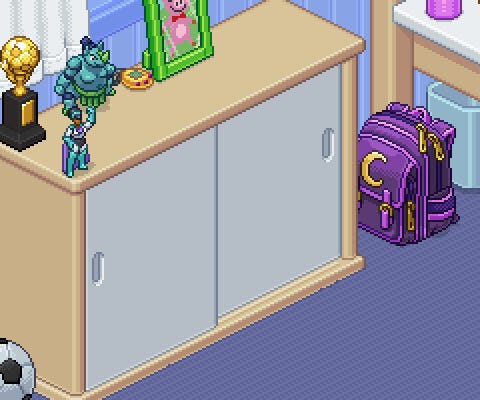
Engaging with the community on various platforms
At the time Unpacking went viral, and all the way until June 2021, Witch Beam didn't have a specific team member focusing on community. So in the early days, the team focused on growing its Twitter following more than anything else.
"We were trying to also engage with people on Steam once we realised that people were actually posting in our Steam forum -- I think it took us several months to notice," Brier laughs.
When you create your Steam page, the platform automatically assigns it a forum page, which no one at Witch Beam knew. But they soon turned it into a chance to reach out to their community.
"During the digital shows, it was a good opportunity to engage with Steam people and for getting wishlists," Brier says. "That's what we've been doing all this time: gathering wishlists. In the beginning, it went really slowly. You have the little bursts, but then it just meanders for a long time."
"Anytime you do anything, just let everyone who's already following you know about it"Tim Dawson, Witch Beam
The wave of digital events since the beginning of the COVID-19 pandemic proved to be very valuable, especially the ones organised by Steam itself. Additionally, developers shouldn't underestimate the power of a mailing list.
"Before we even had a Steam page, we started a mailing list -- I think almost immediately, as early as we could, and we made a little Squarespace website for the game," Brier says. "All it had was a placeholder image and it just said something like: 'We're still unpacking this website, please check back later', and sign up to our mailing list. The mailing list was the only call to action that we had."
Witch Beam used the mailing list for big announcements, like the release of the demo, a new trailer, or attendance to an event.
"One of the ways to keep things going is, anytime you do anything, just let everyone who's already following you know about it," Dawson says. "We would send around emails before events saying 'Unpacking will be at this place doing some stuff' and even though most of the people on that mailing list are not going to be physically in San Francisco or wherever it was, it still gives everyone that feeling of: 'Wow, that game is going places, they must be working hard.'
"And that's part of keeping the whole thing alive, because you don't want people to just forget about you or think [you] gave up on that project. We [didn't] want people to pay huge amounts of attention to us, because we were not going to be finished with the game until a couple of years later, but we wanted them to keep [thinking] at the back of their mind: that game is on track and they're doing good things."
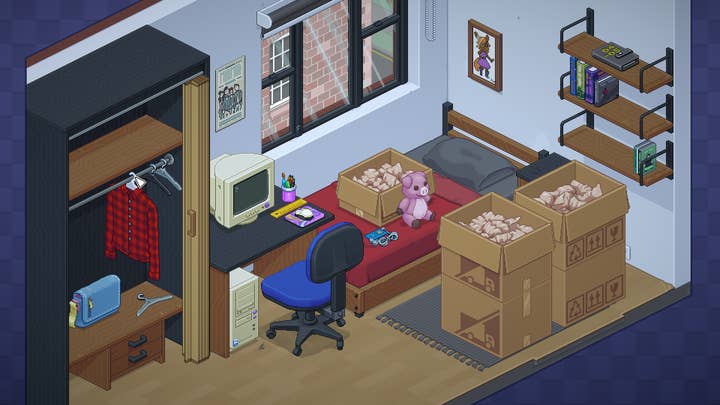
For developers trying to keep up the pace, Brier says it's important to budget a lot of time for doing both business and marketing tasks, and not just pure game development.
"There's been times where my schedule was three days on marketing and business dev, and two days on actual development in a week," she says.
And that's despite having signed a publishing deal with Humble Bundle following the game's popularity online.
"Even with a publisher, the engagement from a developer is really important," she continues. "It depends on the kind of developer you are but we felt like, I think partly because we announced so early, we wanted to engage our community ourselves and we wanted to keep that connection.
"Unpacking is a very personal game for me and Tim, and it feels like it would be really wrong to hand [it] over to someone else to do stuff with. It's still ours and we still want to have control over how we portray the game, control the messaging."
"Even with a publisher, the engagement from a developer is really important"Wren Brier, Witch Beam
And even if you feel like it's work that is not moving the game forward, it's necessary work. Dawson remembers a Steam Next Fest where the demo was up for a week, meaning it was "almost a complete write off" for any development work during that time.
"Every time we have a limited demo we get some hate afterwards where people are like: I don't understand why anyone would ever have a limited demo? Why not just leave it up all the time? Because it's really good at focusing people to show up, and participating, and it means we can pay attention to anyone who's playing the demo.
"It meant if someone had a technical issue, I could jump on it. Sometimes you have to resolve it and republish the demo, and if just had the demo ongoing, we wouldn't really be able to do any of that. It was really about saying: okay, this is going to be all about user engagement and seeing what people think of it, and then we put it away and we stop, and we go back to work hard on the game. And having that cut off was really valuable.
"It's better to do a steady heartbeat and have content engagement than it is to try to go all in chasing everything"Tim Dawson, Witch Beam
"Working on the marketing, which is an important but different part of [working on the game], doesn't get the game shipped. But that's part of that heartbeat thing, where it's better to do a steady heartbeat and have content engagement than it is to try to go all in chasing everything, stuff that you may not be able to do anything with if you don't actually finish your game."
Witch Beam hired Innersloth's community director Victoria Tran in June 2021 to start Unpacking's Discord community, as well as its TikTok. She actually wrote a short Twitter thread on building up the latter. Dawson highlights the importance of relying on experts to do the bits of the development journey that you're not sure how to handle.
"[Tran] was super helpful for getting the Discord, which was an area that we didn't really know too much about. It was one of those things where a small amount of her time equals what would have taken a lot of ours, messing around and making mistakes."
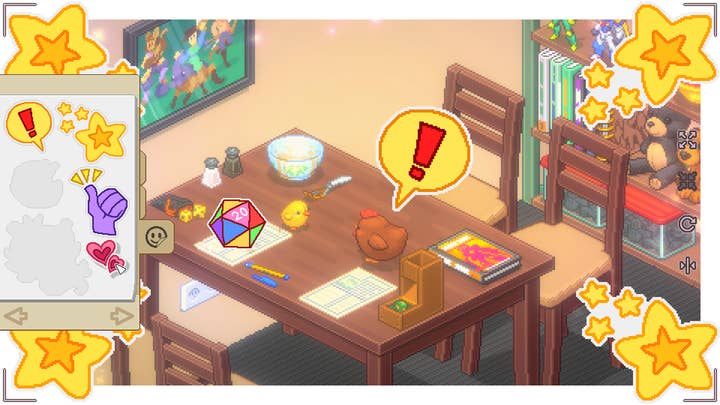
One day at a time
Now, three years after going viral, Unpacking is finally ready for release. The title will launch on November 2, on Xbox One, Switch, Steam and Humble Store.
Brier jokingly says that it feels like the end of high school, adding that she can't think of anything else in her life that's taken her so long.
As Dawson mentioned -- and it's something he also had told GamesIndustry.biz back in 2018 -- Witch Beam initially thought Unpacking was going to stay in development for around a year and a half.
"The interesting thing is that Unpacking's scope barely changed," Brier says. "What we actually had planned for the game barely changed from the time that we did that interview, but we just underestimated how long it takes to do things, just to make a game; all of the different parts, art for 35 rooms and over a thousand items, and just programming in all the features, and we're such a small team."
"The interesting thing is that Unpacking's scope barely changed. We just underestimated how long it takes to do things"Wren Brier, Witch Beam
Dawson adds that they also underestimated the level of quality and detail that they wanted to hit for the game.
"Being an indie dev, unless we run out of money, we can do what we want -- we don't have someone above us who can cancel the project if they don't like it," he says. "Whatever we do we want it to fulfill the ambitions we have for the game, so given the task of taking longer or doing it worse we just [took longer]."
Nothing went majorly wrong, he continues. Witch Beam is still working in 2021 on the same version they were working on in 2018, there wasn't any dramatic redesign or reboot. And this is something that Brier thinks every developer should know: everyone thinks their project will take less time.
Which is why her biggest piece of advice to fellow indie developers is to pace yourself.
"I think there have been times where I've gone too hard all at once," she says. "It's especially hard when it's such a long project and sometimes you're right in the middle of it and you can't see the start anymore, and you can't see the end. That to me was the hardest part, and the way I got through that was with Tim's advice: one foot in front of the other. Not looking too far ahead.
"Most days I can't look up. Because it's like looking down and then seeing how far the fall is"Wren Brier, Witch Beam
"We do sprints, we work with Scrum, and so we do two-week sprints. Every day we look at that day's tasks and go: I'm doing this today. And then every two weeks we look at our backlog and go: what are we going to be doing the next two weeks? And then every milestone, we look at everything that we know we need to do in general. So break things down to as small [a task] as possible.
"Most days, I'm just looking at the task I'm doing that day. And then every so often I look at what I'm doing for two weeks, and then once in a while I'm looking at what I'm doing for the next three months. But most days I can't look up. Because it's like looking down and then seeing how far the fall is."
More GamesIndustry.biz Academy guides to Selling Games
Our guides cover various aspects of the publishing process, whether you're a young game developer about to start a new project or an industry veteran:
